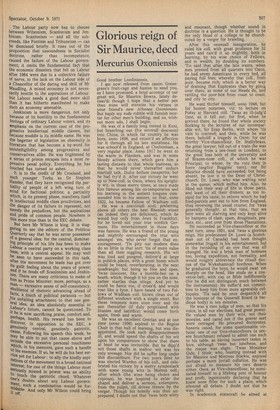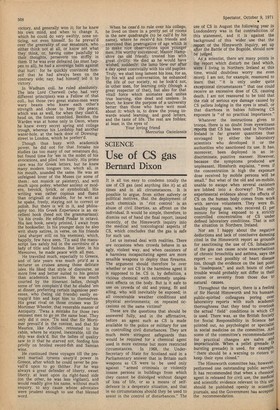Glorious reign of Sir Maurice, decd
Mercurius Oxoniensis
Good brother Londiniensis,
I am now released from canon Goosegrass's fruit-cage and hasten to send you, as I have promised, a brief accompt of our great wit, Sir Maurice Bowra, lately deceas'd; though I hope that a better pen than mine will eternize his virtues in your friend's new Athenae Oxonienses. But haply my rude rubble will furnish mortar for other men's building, and so, without more ado, I shall begin.
He was of a family long rooted in Kent, but branching out (for severall descents) into China; in which far country he was born, anno 1898, and retain'd an affection for it through all its late mutations. He was school'd in England, at Cheltenham, a very regular place. A nno 1917 he went to the warre in Flanders, and was in some bloody actions there, which gave him a lasting distaste to that whole business, so that he would never thereafter endure martiall talk. Dulce bellum inexpertis; but he had try'd it. After our victory he went up to New-coil, in Oxon, where his sprightly wit, in those merry times, at once made him famous among his co-temporaries and his learning in the antient tongues commended him to his seniors, so that, anno 1922, he became Fellow of Wadham coll.
He was a conviviall soul, preferring above all others the best Rhenish wines (as indeed they are delicious), which he would buy only from Jews in Frankfort; for he loved not your true nordick Germans. His entertainment in those days was famous. He was a friend of the young and mightily encouraged the true wits amongst 'em, who never forgot that encouragement. 'Tis pity our modern dons do so little in that sort: 'tis of more value than all their niggling research. His wit was loud and pungent, deliver'd at large in publick places, with a great boom which could be heard, reverberating, in the next quadrangle; but being so free and open, 'twas innocent, like a humble-bee on a heath, which, though it hit you on the nose, rather startles than stings. And yet he could be fierce too, if cross'd, and would roar like a lyon. I have heard of two Fellows of Wadham coll, blown clean out of different windows with a single snort. But these tempests were soon over and the sun thereafter (if duly propitiated with litanies and sacrifice) would come forth again, fresh and warm.
He was an excellent Grecian and at one time (anno 1936) aspired to the Regius Chair in that hall of learning, but was disappointed. He took such disappointments ill, and would spend the shafts of his wit upon his conquerours to show that there at least he was invincible. But he dipp'd not those shafts in malice: wit was his only revenge. Nor did he suffer long under this discomfiture, For two years later he was elected Warden of his coll., and celebrated his victory by a merry symposiack with some young wits in Merton coll.; after which (the wine being choice and copious), he was inspired to enter the chapel and deliver a sermon, extempore, from the pulpit, till driven thence by the verger. Though his homily was thus unprepared, I doubt not that 'twas both witty
and resonant, though whether sound in doctrine is a question. He is thought to be the only Head of a college to be churchouted by a verger for brawling.
After this unusuall inauguration, he ruled his coll, with great prudence for 32 years and rais'd it up mightily, both in learning, by his wise choice of Fellows, and in wealth, by doubling its numbers. 'Tis said that after the late warre, when men pressed from all quarters into Oxon, he had seven Americans in every bed, all paying full fees; whereby that coll., from poor, became rich; which is a better way of draining that Euphrates than by going over there, as some of our Heads do, and rattling the poor-box from coast to coast, and city to city.
He went thither himself, anno 1948, but for honest purposes, viz: to lecture on Poesy at Harvard coll. 'Twas an ill-judg'd time, as it fell out; for first, when he arrived there, he found that whole society flocking to the lectures of our incomparable wit, Sir Esay Berlin, with whom 'tis vain to contend; and then, while he was there, behold! a tragedy in Oxon: for our worthy Vice-chancellour, Dr. Stallybrass, the great lawyer, fell out of a train (he was returning from a law-feast in London), to the great loss both of the university and of Brazen-nose coll., of which he was Principal; to whom, by the rota then in force (anglice Huggins' turn), our Sir Maurice should have succeeded; but being absent, he lost it to the Dean of Christchurch, Dr. Lowe, who was waiting next in the queue; which miffed him. Also, he liked not their way of life in those parts, and least of all their dinners, as too insipid for his taste; to relieve which he had food-parcels sent out to him from England, thus reversing the usual course; for 'twas generally thought, at that time, that we here were all starving and only kept alive by hampers of clam, spam, doughnuts, peanuts, etc., sent over from those Plantations.
He succeeded as Vice-chancellour at the next turn, anno 1951, and 'twas a glorious reign. His predecessor Dr. Lowe (a Scotchman out of Canada) had been thought somewhat frugal] in his entertainment; but in the twinkling of an eye that was all changed. He was a brisk man of business too, loving expedition, not formality, and would roughly abbreviate the rituall dances of the Wykehamicall brethren. When he graduated the boys, he would swat 'em sharply on the head, like studs on a conveyor-belt, with cap or Bible indifferently (for he did not distinguish much between the instruments). He suffer'd not committees to keep him from more agreeable colloquies. 'Tis said he once despatch'd all the business of the Generall Board (a taedious body) in ten minutes. He was a rare judge of men, so that his voice, in all our elections, had great power. He valued men by their wits, not their morales, and cared not if the graver sort were outraged. He procured doctorates, honoris causd, for some questionable virtuosi: one of our Vice-chancellours (a severe Scotchman) refused to admit one such to his table, as having incorrect tastes in love, although 'twas but luncheon, and the risque was slight. 'Twas Monsieur Gide, I think; who, feasting instead with Sir Maurice and Mistress Starkie, enjoyed perhaps a more joviall collation. He was not afraid to measure his own deserts either. Once, as Vice-chancellour, he nominated himself to a lifelong post of honour and profit, ingenuously declaring that he knew none fitter for such a place; which silenced all debate. I doubt not that he was right.
In academick statecraft he aimed at victory, and generally won it; for he knew his own mind, and when to change it, which he could do very swiftly, none noticing, not even himself. So he prevail'd over the generality of our senatours, who either think not at all, or know not what they think, or, having come painfully to their thoughts, persevere too stiffly in them. If he was ever defeated (as must happen to all), he had a sovereign balm against that hurt : for he quickly convinced himself that he had always been on the contrary side; nay, had himself led it to victory.
In Wadham coll, he ruled absolutely. The late Lord Cherwell (who had very different principles) was a Fellow of that coll., but those two great states-men were wary beasts who knew each other's strength and chose to keep the peace; which was as well, for when they clash'd, head on, the forest trembled. Besides, the Warden was at home only in Oxon, where he knew every secret spring and college trough, whereas his Lordship had another water-hole, at the back door of Downingstreet in London, which he preferr'd.
Though thus busy with academick power, he did not for that forsake his studies (as too many of our senatours do), but found time for 'em in the midst of his avocations, and plied 'em busily. His prime care was for Greek letters, but he knew many modern tongues too, which all, in his mouth, sounded the same. He was an unfeigned lover of the Muses (or some of them : not musick or paintery), and writ much upon poesy, whether antient or modern, heroick, lyrick, or symbolicall. His writing was rather copious and fluent than originall or durable, for he writ as he spake, freely, staying not to correct or polish. But there is wit in it, and philosophy too. His Greek Experience is an excellent book (heed not the grammarians): 'tis his credo. He edited Pindar in octavo. His last book, newly printed, I await from the bookseller. In his younger days he also writ sharp satires, in verse, on his friends (and sharper still on his enemies), which, happily, few have seen. 'Tis said the manuscript lies safely hid in the escritoire of a lady of title and fashion. But later, in his Memoires, he made peace with all men.
He travelled much, especially to Greece, and of late years was much priz'd as a lecturer on cruises among those delicate isles. He liked that style of discourse, as more free and better suited to his genius than academick lectures. He was much courted by the itinerant ladies, though some of 'em complain'd that he eluded 'em at dinner, preferring certain ingeniose peeresses, who (being old friends) easily entrapp'd him and kept him to themselves. His great rival on those cruises was Sir Mortimer Wheeler, that venerable master of Antiquity. 'Twas a mistake for those two eminent men to go on the same boat. They only did it once. 'Tis said that. Sir Mortimer prevaii'd in the contest, and that Sir Maurice, like Achilles, retreated to his cabin, where he stayed, inexorable, till the ship was dock'd. But the ladies of quality saw to it that he starved not, feeding him privily on broiled sword-fish and Samian wine.
He continued these voyages till the present martiall tyrants usurp'd power in Greece, after which he could never be prevail'd upon to go thither. For he was always a great defender of liberty, sweet liberty, at least upon its right-hand side (on the other, he was less vigilant), and would readily give his name, without much enquiry, to any cause whose advocates were prudent enough to use that blessed word. When he ceas'd to rule over his college, he lived on there in a pretty set of rooms in the new quadrangle (to be call'd by his name), where he receiv'd his friends and exercised that praerogative of age which is to make nice observations upon younger men. His worthy successour, Master Hampshire (an old friend), treated him with great civility. He died as he would have wished, suddenly: the lamp blew out after a day spent convivially with his old pupiles. Truly, we shall long lament his loss, for as, by his wit and conversation, he enhanced the life of our society, so he look'd not, in other men, for learning only (though a great respecter of that), but also for that vitall force which animates and unites true learning, else dead and useless. In short, he knew the purpose of a university better than those who have writ most about it: which is, to draw the young towards sound learning, and good letters, and the taste of life. The rest are foibles; at least in the eyes of Your loving friend Mercurius Oxoniensis











































 Previous page
Previous page